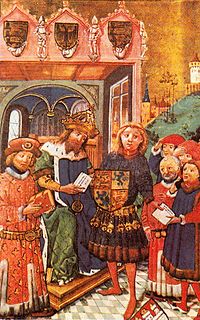Otto Henry may refer to:

The House of Wittelsbach is a German dynasty, with branches that have ruled over territories including Bavaria, the Palatinate, Holland and Zeeland, Sweden, Hungary, Bohemia, the Electorate of Cologne and other prince-bishoprics, and Greece. Their ancestral lands of the Palatinate and Bavaria were Prince-electorates, and the family had three of its members elected emperors and kings of the Holy Roman Empire. They ruled over the Kingdom of Bavaria which was created in 1805 and continued to exist until 1918.
Henry V may refer to:
A count palatine, also count of the palace or palsgrave, was originally an official attached to a royal or imperial palace or household and later a nobleman of a rank above that of an ordinary count. The title originated in the late Roman Empire. In the Middle Ages especially and into modern times, it is associated with the Holy Roman Empire.
Henry VI may refer to:
Richeza or Richenza is a woman's first name. It is a Polish name of Old Icelandic origin (Rikissa). In Old Icelandic Rixa means wealthy. It can be compared to other names ending in -ric.

Otto I of Brunswick-Lüneburg, a member of the House of Welf, was the first duke of Brunswick-Lüneburg from 1235 until his death. He is called Otto the Child to distinguish him from his uncle, Emperor Otto IV.

Otto I, called the Redhead, was Duke of Bavaria from 1180 until his death. He was also called Otto VI as Count Palatine of Bavaria from 1156 to 1180. He was the first Bavarian ruler from the House of Wittelsbach, a dynasty which reigned until the abdication of King Ludwig III of Bavaria in the German Revolution of 1918.
Otto of Wittelsbach may refer to:

Henry V, the Elder of Brunswick, a member of the House of Welf, was Count Palatine of the Rhine from 1195 until 1212.

Palatinate-Neuburg was a territory of the Holy Roman Empire, founded in 1505 by a branch of the House of Wittelsbach. Its capital was Neuburg an der Donau. Its area was about 2,750 km², with a population of some 100,000.
Sulzbach or Sülzbach may refer to:

Philip the Upright was an Elector Palatine of the Rhine from the house of Wittelsbach from 1476 to 1508.

Otto-Henry, Elector Palatine, a member of the Wittelsbach dynasty was Count Palatine of Palatinate-Neuburg from 1505 to 1559 and prince elector of the Palatinate from 1556 to 1559. He was a son of Rupert, Count Palatine, third son of Philip, Elector Palatine; and of Elizabeth of Bavaria-Landshut, daughter of George of Bavaria.

Otto V, Count of Wittelsbach, also called Otto IV, Count of Scheyern, was the second son of Eckhard I, Count of Scheyern. Otto named himself Otto of Wittelsbach, after Wittelsbach Castle near Aichach. He served Henry V, Holy Roman Emperor, in his first Italian Expedition in 1110–1111. Emperor Henry V already addressed him as Otto Count of "Witlinesbac" in a document in 1115. From 1120 onwards, he was Count palatine of Bavaria.
Otto I (912–973), known as Otto the Great, was German king from 936 and Holy Roman Emperor from 962 to 973.

Otto Henry of Sulzbach was the Count Palatine of Sulzbach from 1569 until 1604.
Henry VI "the Younger" of Brunswick, of the House of Welf, was Count Palatine of the Rhine from 1212 to 1214.
Otto of Bavaria may refer to:
Henry of Bavaria may refer to:

The Palatine Lion, less commonly the Palatinate Lion, is an heraldic charge. It was originally part of the family coat of arms of the House of Wittelsbach and is found today on many coats of arms of municipalities, counties and regions in South Germany and the Austrian Innviertel.